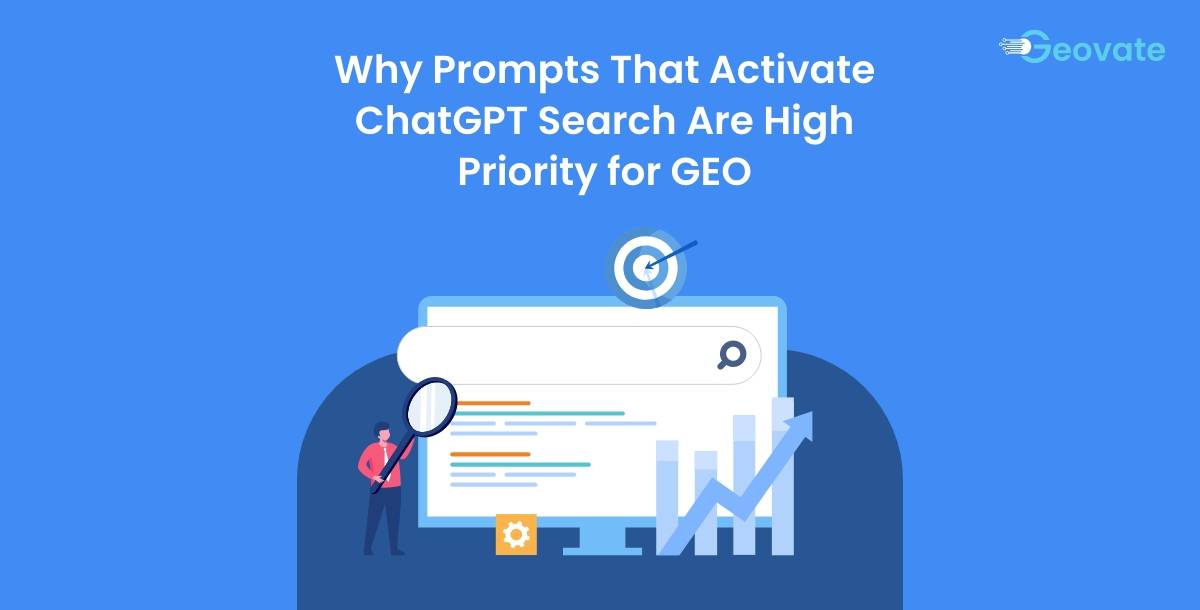Why Prompts That Activate ChatGPT Search Are High Priority for GEO
Thu,18 Sep 2025 14:00:00- Font Size
- Share Content

Artificial intelligence is redefining how people discover and consume information. For businesses, marketers, and SEO professionals, this transformation means that traditional SEO alone is no longer enough. Today, you need to optimize for Generative Engine Optimization (GEO)—a strategy focused on making sure AI-driven systems like ChatGPT surface your content.
One of the most valuable insights in GEO is understanding when ChatGPT uses its internal knowledge base versus when it activates real-time search. Why? Because when it triggers a search, your SEO work becomes directly relevant. In other words, knowing how to rank in ChatGPT search is becoming just as critical as knowing how to rank in Google.
In this article, we’ll explore why search-activated prompts are high-priority opportunities, how to identify them, and most importantly, how to rank on ChatGPT search effectively.
The Two Ways ChatGPT Responds
ChatGPT generates answers in two primary ways:
1. Internal Knowledge Base
- Relies only on pre-trained data.
- Limited by cutoff dates and static information.
- Answers may not reflect the latest trends, launches, or updates.
2. Search-Enabled Responses
- Activates real-time web search through engines like Bing and Google.
- Aggregates results into a synthesized, conversational response.
- Often shows external references or implied sources.
For marketers, the second response type is the most valuable. These search-activated prompts create direct opportunities for businesses to learn how to rank in ChatGPT search and leverage traditional SEO tactics for GEO.
Why Search-Activated Prompts Are High Priority
When ChatGPT activates search, it behaves similarly to a traditional search engine:
- Freshness matters:Up-to-date content is prioritized.
- Relevance counts: Keyword-rich, targeted content increases visibility.
- Metadata plays a role: Titles, descriptions, and schema guide selection.
- Authority signals matter: Trusted, authoritative domains have higher chances of inclusion.
In practice, this means your existing SEO investment directly influences your chances of visibility in ChatGPT answers. That’s why search-activated prompts are high priority—because they allow you to apply what you already know about how to rank on ChatGPT search through proven SEO fundamentals.
Examples of Search-Activated Queries
Consider these two questions:
- “What is the best app builder of 2025?”
- “What are the best app builders of 2525?”
Both force ChatGPT to look beyond its static knowledge and activate web search. The system then aggregates the top-ranking content and builds a summarized response.
For a business, this means the optimization work you do for Google or Bing visibility is directly tied to how to rank in ChatGPT search. If your content surfaces in traditional search, you’re also increasing your likelihood of being pulled into ChatGPT’s answer set.
Tracking Search-Driven Responses
If you want to master how to rank on ChatGPT search, you need to monitor which prompts trigger search. Ways to do this include:
- Tracking responses with links: Clear evidence that the AI pulled from external sources.
- Measuring average links: Prompts with more references are more search-dependent.
- Spotting trends: Watch how prompts evolve over time—especially those shifting from internal knowledge to external sourcing.
By identifying these prompts, businesses can adjust content strategies and target areas where traditional SEO overlaps with GEO.
How to Identify Search-Activated Prompts
Search-activated prompts share common traits:
- They cite external sources: If ChatGPT shows references, it used search.
- They involve time-sensitive topics: “Best of 2025” or “latest trends” queries nearly always activate search.
- They require aggregation: Comparative or list-style questions usually push ChatGPT to scan the web.
Examples include:
- “Best [software/tool] of 2025”
- “Top [industry solutions] right now”
- “Latest [topic] updates”
These are exactly the queries to focus on if you want to understand how to rank in ChatGPT search.
Why This Matters for GEO
Generative Engine Optimization is about preparing content to be chosen by AI systems. When ChatGPT uses search, it relies heavily on signals similar to those in traditional SEO.
That means your ability to understand how to rank on ChatGPT search depends on the same factors you already optimize for—plus an awareness of how AI selects, filters, and synthesizes information.
- Strong SEO improves both Google visibility and ChatGPT visibility.
- Clear metadata and schema markup boost AI comprehension.
- Regular content updates align with AI’s preference for freshness.
This dual influence makes search-activated prompts some of the highest ROI opportunities in modern digital marketing.
Action Plan: How to Rank in ChatGPT Search
Now that we understand the value of search-activated prompts, here’s how you can optimize effectively.
1. Map Search-Activated Prompts
Brainstorm questions your audience might ask AI. Focus on “best,” “top,” and “latest” queries. These are your entry points into learning how to rank on ChatGPT search.
2. Keep Content Fresh
Quarterly or even monthly updates to key pages (like product roundups and comparisons) are essential. The fresher your content, the higher your chance of inclusion.
3. Leverage Structured Data
Schema markup and rich snippets help AI parse and prioritize your content. This technical SEO layer is critical for mastering how to rank in ChatGPT search.
4. Refine Metadata
ChatGPT uses signals from titles and descriptions. Ensure your metadata is keyword-rich, user-focused, and aligned with likely prompt structures.
5. Test and Track
Run prompts through ChatGPT, track which ones activate search, and refine your strategy. GEO success depends on continuous testing and adaptation.
Future of SEO in the ChatGPT Era
The future of SEO is not about choosing between search engines and AI—it’s about optimizing for both. Traditional SEO practices are still vital, but GEO extends their reach into the world of conversational AI.
Businesses that invest early in learning how to rank on ChatGPT search will capture visibility where users are increasingly spending time: inside AI platforms.
Over the next few years, the distinction between SEO and GEO will blur. Ranking in Google will not only drive traffic but also power AI-generated responses. Those who master both worlds will dominate digital visibility.
Final Thoughts
Not every ChatGPT response is within your control. Internal knowledge responses are largely untouchable. But when the AI activates its search wrapper, your SEO work pays dividends in two places at once—on traditional search engines and inside AI-generated answers.
The key is to recognize, track, and prioritize these search-driven opportunities. Businesses that understand how to rank in ChatGPT search will have a significant edge in the future of AI-driven discovery.
Frequently Asked Questions
Q1. What is a search-activated prompt in ChatGPT?
A search-activated prompt is a question or request that makes ChatGPT pull in real-time results from the web before responding. These prompts often cover trending, current, or comparative topics.
Q2. Why are search-activated prompts important for GEO?
They connect traditional SEO signals with AI-generated answers. If you know how to rank on ChatGPT search, your content can appear in both Google and ChatGPT results, maximizing visibility.
Q3. How can I tell if ChatGPT used search for a response?
Look for external references or sources in the answer. Prompts involving “best of,” “top tools,” or “latest trends” almost always use search.
Q4. How often should I update content to rank in ChatGPT search?
At least quarterly, though fast-moving industries may require monthly updates. Frequent refreshes improve your odds of ranking in search-driven AI answers.
Q5. Is optimizing for ChatGPT different from optimizing for Google?
Not entirely. Traditional SEO signals still apply, but with added emphasis on freshness, metadata clarity, and understanding which prompts activate search. Learning how to rank in ChatGPT search is essentially about applying SEO best practices to an AI-first world.
